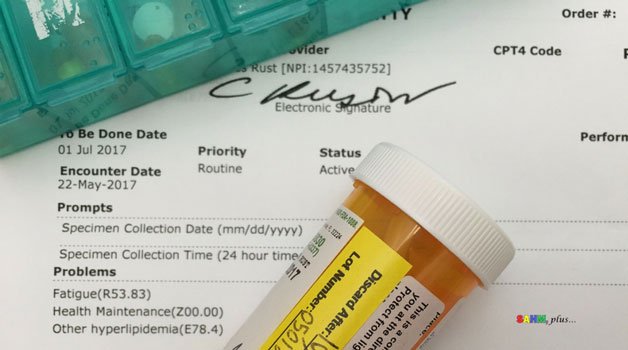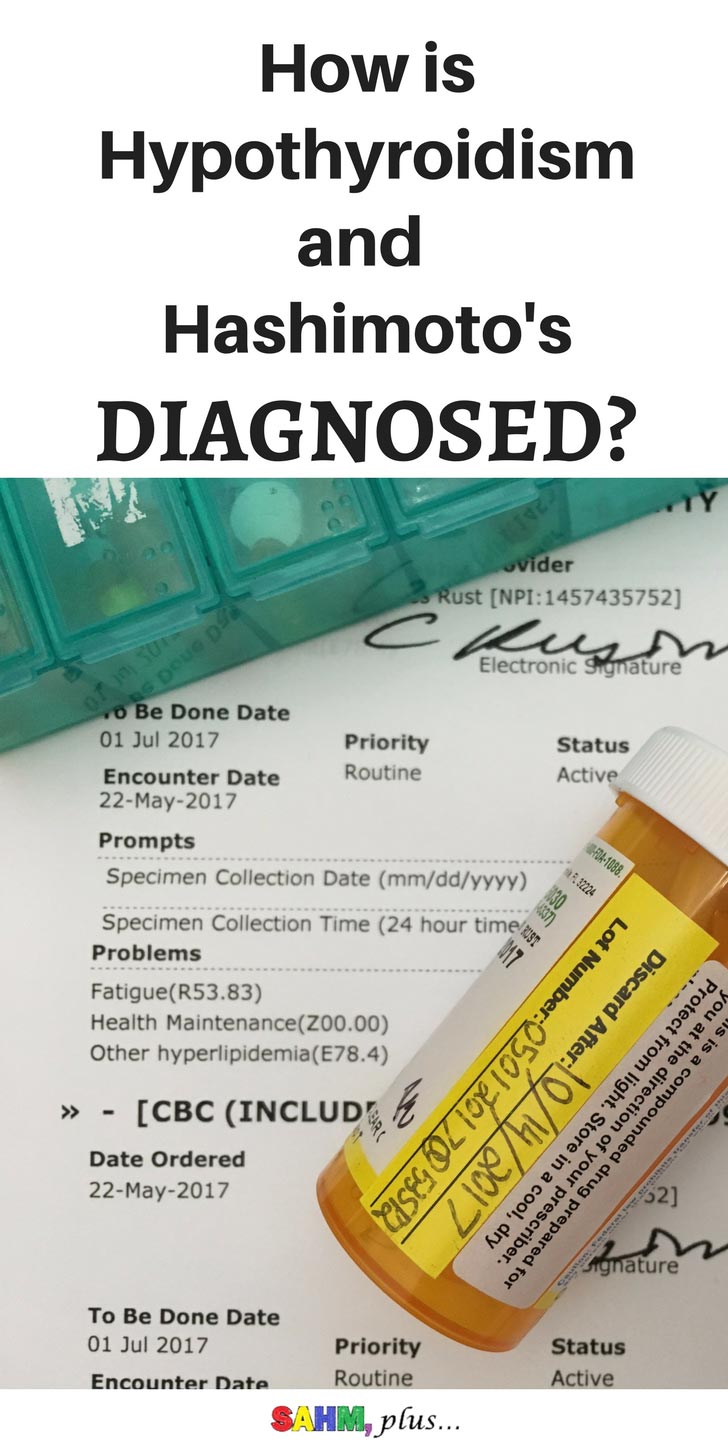Hypothyroidism is a relatively common condition. As I discussed in a previous post, approximately 12% of Americans will develop a thyroid condition. That’s millions of people!
Women also happen to be more likely to have hypothyroidism.
In order to receive a diagnosis, you will see your doctor and schedule to have lab work done to evaluate your thyroid function. And, the sooner you receive a diagnosis, the quicker you can start treatment and feel better.
It’s important to note that you don’t want a simple single modifier to determine your thyroid’s status. Sometimes, you’ll find a doctor who will only test TSH. This is not an accurate account of your thyroid’s functions as it doesn’t tell the whole picture.
Bear in mind this quote from the American Association of Clinical Endocrinologists in the ATA/AACE Guidelines for Hypothyroidism for Adults, Endocr Pract. 2012;18(No. 6) 989:
“Environmental iodine deficiency is the most common cause of hypothyroidism on a worldwide basis (16). In areas of iodine sufficiency, such as the United States, the most common cause of hypothyroidism is chronic autoimmune thyroiditis (Hashimoto’s thyroiditis).”

With that in mind, arm yourself with the following information. If you suspect you have hypothyroidism, the following will help you make sense of what you need to have tested.
Further, I believe, from personal experience, it’s important to also be tested for Hashimoto’s Thyroiditis (an autoimmune condition that attacks your thyroid) at the same time. Simply treating your thyroid may not be enough if you also have the autoimmune component.
How is hypothyroidism diagnosed?
Blood tests are the best indicator of hypothyroidism.
I don’t want you to get sub-par tests done either! I want you to get a full panel of informative tests so that you can get appropriate treatment.
I just want to discuss a bit of the anatomy for you to understand a few things. Knowing some of things will help ensure your doctor tests for everything you need to know. And, you’ll have a better understanding of what your test results mean.
Knowledge is power! My personal belief is that you are your own best health advocate. So, don’t go into this blindly.
Here’s a bit of an anatomy explanation first.
Two parts of your brain and the thyroid gland work together to make your thyroid system is working effectively.
Your pituitary gland (a part of your brain) controls your thyroid gland, which is located in your neck. The thyroid and pituitary glands are in constant communication with one another to regulate the release of various hormones.
Your hypothalamus, which is another part of your brain, regulates and works with the pituitary gland.
This is how they work together:
The hypothalamus in your brain releases Thyrotropin Releasing Hormone (TRH).
TRH then stimulates the pituitary gland in your brain to release Thyroid Stimulating Hormone (TSH).
Now, the TSH signals the thyroid gland (located in your neck area) to release its hormones (T4 and some T3). T4 also gets converted into T3. The thyroid also releases calcitonin, which is related to calcium and bone metabolism, but for the purposes of this, we do not need to discuss it. T4 and T3 then go about their work of maintaining a healthy metabolism, as well as ensuring proper growth in infants and children.
Here’s a schematic of what was just explained:
The hypothalamus releases TRH –> Pituitary Gland releases TSH –> Thyroid Gland releases T4 and some T3 (and calcitonin).
What tests will be performed to diagnose hypothyroidism?
It’s important you know the different types of tests are available for a proper diagnosis. When your doctor requests lab work, make sure these are performed, at a minimum:
- Thyroid Stimulating Hormone (TSH) – This is usually the most common test. Hypothyroidism can be detected if the TSH is high. This test can also be helpful in diagnosing subclinical hypothyroidism, where you have higher than normal levels of TSH, but normal levels of T3 and T4.
The reason behind the TSH test is that in healthy individuals with normal, functioning thyroids when their thyroid hormones get too low, the pituitary knows it has to make more TSH telling the thyroid to make more of its hormones. When the pituitary receives feedback that the thyroid has made enough hormones, then it slows its production of TSH. That is how it is supposed to work.
However, in the case of hypothyroidism, when the thyroid is not making enough thyroxine (T4), the pituitary tries to stimulate the thyroid to make more by producing more TSH. However, if the thyroid cannot make more T4 (depending on what is wrong with the thyroid), the pituitary keeps on making more and more TSH, resulting in higher amounts of TSH.
So when high levels of TSH are seen, it could mean that the body also has low levels of T4. In rare cases, there may be something wrong with the pituitary.
- Total Thyroxine (T4) – Most of the T4 in your blood is attached to a protein. About 1% is not. A total T4 test is looking at both kinds of T4 (bound and not). The free T4 (the 1%) is what affects your tissues.
- Free Thyroxine or Free T4 – This test checks the amount of free T4 available for actual use by your body.
- T3 Tests – There are Total T3, Free T3, and Reverse T3 tests. Like T4, T3 circulates in the blood mainly bound to proteins, but 1% is not bound. It is that 1% that is believed to be most potent in its effects at the cellular level, even in comparison to T4. In fact, your body converts T4 into T3. How well it does this in all individuals is a matter of debate.
No matter what, T3 is another important blood test to consider. The Free T3 and Reverse T3 tests can also provide valuable information. Free T3 appears to correlate best with your functioning.
Reverse T3 is a controversial test that is not often done by medical doctors because it is assumed that your body can convert T4 into T3 without problems. However, holistic practitioners and some medical doctors are now recognizing it as an important test. Reverse T3 is a product created when your body converts T4. It should convert it into T3, but instead, it converts it into Reverse T3. This Reverse T3 is useless to your body’s cells, and cannot provide the energy they need.
- Thyroid Antibodies – It is quite common for someone with hypothyroidism to have thyroid antibodies, created when the body attacks its own tissues. This will determine whether or not hypothyroidism is caused by autoimmunity.
Blood tests have been described above to help in the diagnosis of hypothyroidism. This will also help in determining the course of action necessary to make you feel better.
Some doctors use only one or two tests. Advocates for hypothyroid patients recommend that a full workup of blood tests be done. The above-mentioned is also by no means the exhaustive list of labs you may take. Personally, my doctor requires a check of a few other things regularly, including, but not limited to, Vitamin D, B, and more.
The most important thing is to find a doctor who is willing to help you get better by figuring out what is happening to your body.


1 comment
How often is it diagnosed?
Comments are closed.